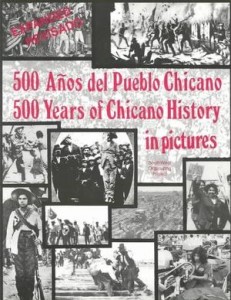Nearly two years ago, the Tucson school district dissolved the acclaimed Mexican American Studies program. In doing so, they removed seven books by Latino and Native writers from the curriculum. Last night, the TUSD school board voted 3-2 to allow the books as supplementary classroom materials.
In response to the dissolution of the MAS program, the following books had been (by some accounts forcibly) removed from classrooms but can now be used to supplement instruction:
• Critical Race Theory by Richard Delgado
• 500 Years of Chicano History in Pictures edited by Elizabeth Martinez
• Message to Aztlan by Rodolfo “Corky” Gonzales
• Chicano! The History of the Mexican American Civil Rights Movement by Arturo Rosal
• Occupied America: A History of Chicanos by Rodolfo Acuña
• Pedagogy of the Oppressed by Paulo Freire
• Rethinking Columbus: The Next 500 Years by Bill Bigelow
School board approval is required in order to use a supplemental book in classrooms. The ban on these seven books had been particularly contentious because it appeared to target Latinos in particular. Before last night’s meeting, very few titles on the approved list touched on the Mexican American experience, with The House on Mango Street by Sandra Cisneros being the most well known of the handful of titles. Further, the rule regarding school board approval has historically been poorly enforced — some teachers claim that they have never sought out approval over the decades they have taught in the system — and the enforcement that did take place may have targeted former MAS instructors in particular.
The school district ended the MAS program in response to a 2010 law passed by the Arizona state legislature that prohibited instruction based on ethnic background. When faced with loss of funding due to violation of the law, TUSD elected to end the MAS program. Throughout, TUSD has argued that the books were not banned because they were still available in the library, but the district has since found itself in violation of a decades-old desegregation lawsuit that mandates “culturally relevant” instruction.
The vote does not necessarily mean that the books will be returned to classrooms, but it does mean that teachers in the system can now use the books if they choose to do so. While reinstatement of the MAS program is what many in the community would prefer, the school board’s decision is ultimately a small victory for the freedom to read.
To view CBLDF’s prior coverage of the ban, click on the links below:
Embattled Mexican American Studies Program Finds Another Way
Court Upholds Law that Led to Tucson Book Ban
Move by Tucson School Board May Mean Overturn of Book Ban
Effort to Return MAS Books to Classrooms Fails in Tucson
Tucson School District Blocks Renowned Chicana Author’s Visit
Protestors Take Over Tucson School Board Meeting
Tucson School Board Tightens Security
Latino and Native Authors Keep Tucson Book Ban in the News
CBLDF Joins National Organizations in Condemning Arizona School Censorship
Please help support CBLDF’s important First Amendment work and reporting on issues such as this by making a donation or becoming a member of the CBLDF!
Betsy Gomez is the Web Editor for CBLDF.
